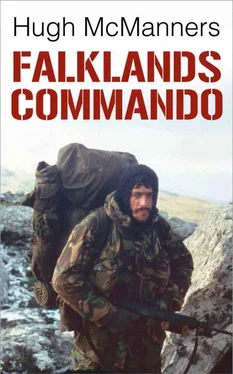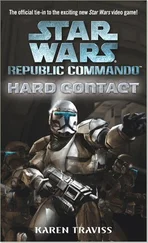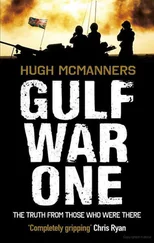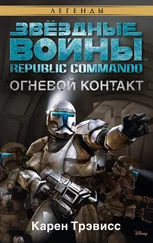Hugh McManners - Falklands Commando
Здесь есть возможность читать онлайн «Hugh McManners - Falklands Commando» весь текст электронной книги совершенно бесплатно (целиком полную версию без сокращений). В некоторых случаях можно слушать аудио, скачать через торрент в формате fb2 и присутствует краткое содержание. Город: London, Год выпуска: 2014, ISBN: 2014, Издательство: Nightstrike Publishing, Жанр: nonf_military, Биографии и Мемуары, на английском языке. Описание произведения, (предисловие) а так же отзывы посетителей доступны на портале библиотеки ЛибКат.
- Название:Falklands Commando
- Автор:
- Издательство:Nightstrike Publishing
- Жанр:
- Год:2014
- Город:London
- ISBN:978-0-992-81540-0
- Рейтинг книги:4 / 5. Голосов: 1
-
Избранное:Добавить в избранное
- Отзывы:
-
Ваша оценка:
- 80
- 1
- 2
- 3
- 4
- 5
Falklands Commando: краткое содержание, описание и аннотация
Предлагаем к чтению аннотацию, описание, краткое содержание или предисловие (зависит от того, что написал сам автор книги «Falklands Commando»). Если вы не нашли необходимую информацию о книге — напишите в комментариях, мы постараемся отыскать её.
Falklands Commando — читать онлайн бесплатно полную книгу (весь текст) целиком
Ниже представлен текст книги, разбитый по страницам. Система сохранения места последней прочитанной страницы, позволяет с удобством читать онлайн бесплатно книгу «Falklands Commando», без необходимости каждый раз заново искать на чём Вы остановились. Поставьте закладку, и сможете в любой момент перейти на страницу, на которой закончили чтение.
Интервал:
Закладка:
The promotion of an individual upsets the established balance of a group, particularly when privates are promoted. Those who were not promoted (but perhaps felt they should have been) are often not prepared to examine their own deficiencies, and can become very bitter about the army, their careers and about life in general. They may become critical of authority, and adopt an injured, surly attitude that hampers or prevents their due promotion, fuelling their feelings of injustice.
The stress created by promotions is felt very much more among other ranks than among officers, although when officers reach certain critical career points (being ‘pink-listed’ for promotion to Lt Colonel for example), disappointments can be felt very keenly. Individuals who have devoted their lives to getting on in the army can find being passed over for promotion (while seeing their contemporaries listed) very hard to bear. Such people usually have few interests outside the army or army life. Not being promoted can seem like being rejected; I knew personally one major who committed suicide after not appearing on the promotion list.
Such desperate disappointment is unbalanced, particularly as in such people it is based on an exaggeration of their own military worth. Throughout their careers they have usually been ultra-conformist, giving their all in order to be promoted. Having subordinated everything in their lives to the army (wife, family, private interests and so on), not being promoted makes the self-sacrifice (and so life) seem suddenly worthless. Among other ranks, the effect of promotion (and lack of it) is more directly felt in their day-to-day lives. A corporal is given a room of his own and becomes a member of the corporals’ club, and a sergeant joins the inner circle of the sergeants’ mess. Promotion affects directly who your friends are and how everybody reacts towards you. In the officers’ mess, by contrast, rank is less important.
Although the British Army does all it can to keep its NCO corps strong (they are the ones who actually fight and win battles), increasingly its best are being siphoned off, promoted to cover officer shortages, peacetime career considerations overriding the need for mature, strong NCOs in war. Sergeants are being promoted younger, partly as an effect of increasing commissioning from the ranks, but also because today’s top NCOs are not as prepared as their forebears to wait for promotion. The traditional father-like, older platoon sergeant, who takes his young officer firmly in hand, is more likely today to be commanding the platoon himself, due to a shortage of officers. Young officers are very much affected by this. Fresh from Sandhurst, they find themselves teamed up with a sergeant who may be even younger, and who therefore is less likely to get a grip of them to understand the reality of their responsibilities. The combination of a young sergeant and a freshly commissioned ‘rupert’ (a common nickname for young second lieutenants) creates extra work for others, particularly the company sergeant major, as inevitably inexperience leads to administrative problems.
Rivalries among NCOs, particularly sergeants, are very much greater than among officers – as young officers invariably discover on social visits to the sergeants’ mess. This rivalry extends from winning military competitions and general military accomplishment, to social attributes – in which drinking can play an important part. Young officers invited into the sergeants’ mess are required to match drink for drink with the sergeants, usually being judged sympathetically by their willingness and application rather than by the end result.
All young officers arriving at their regiment for the first time are desperately keen to establish credibility with their soldiers. The first vital step is to gain some sort of status and relationship with their platoon sergeant – and the competition involved in this process can be fierce. Not all officers succeed. Those who fail have no choice but to put the experience behind them, and possibly invent another leadership personality for themselves to use when they take up another job with a new group of soldiers.
Officers can choose how to play their relations with NCOs and soldiers. It’s possible to be equally successful, by either being completely pukka and unattainable, or by being themselves and meeting NCOs and soldiers at their own level. The latter approach is more difficult, which may be the reason why some officers from comparatively ordinary backgrounds adopt the role of the ‘proper’ army officer.
Israeli society is aggressively egalitarian, with little room for an aristocracy or the concept of gentle breeding. IDF officers are not required to be gentlemen, nor to have any sort of social, academic or even educational superiority over their subordinates. The officers themselves place little value on such things, although there is a growing realisation that the sophistication of military technology makes some kind of science degree a prerequisite for officers. [24]Theirs is a very demanding occupation. Conscripts selected for officer training must sign on for at least one extra year of service, and in peacetime officers work particularly long and unsociable hours. They are three to four times more likely than other ranks to become casualties in combat, the inevitable product of the IDF’s high profile, ‘follow-me’ leadership; and they retire earlier than their western counterparts, some (particularly during the war years) exhausted by years of long hours on duty and stress. In return for this significant burden of responsibility, Israeli society accords a very high status to IDF officers, which is a significant motivating factor in becoming one.
Performance in combat is the prime criterion by which the IDF judges its leaders. Apart from those doctors, engineers and other specialists who join at senior level, all officers have served in the ranks and must then have served, and excelled, as NCOs. There is only one route for promotion, from NCO to officer, with nothing like the parallel career structure offered by most other armies – which keep NCOs and officers in two separate castes. As a result, IDF NCOs are notably young and inexperienced. There is no equivalent to the mature, experienced, cautious (and possibly paternal) senior NCO character that exists in most other armies. The IDF officer must therefore be responsible for much of his senior NCOs’ work, as well as his own – a burden that British officers rarely have to shoulder.
Israeli Defence Force officers are the survivors of rigorous testing and hard work. After basic training and five months with their units (patrolling, training and on operations) they are graded – by kaba score and their unit commander’s evaluation of performance – and must be in the top 50 percent of their intake. Most are then selected for three to four-month NCO leadership courses – considered the toughest in the IDF. Much of the time on these courses is spent on exercise, when they’re deprived of sleep, proper food and shelter. They learn leadership and technical military skills, being evaluated as they perform a wide variety of different military jobs.
The training is personal and very intense. For example, on the NCO tank commanders’ course, students form tank crews which stay with the same instructors for the duration of the course. The instructors take time to get to know each crew member, determining how to bring out the best in each. The instructors have been carefully selected from the previous batch of conscripts and so are the same age as their pupils. To the students, they are known as ‘Gananimm’ (kindergarten teachers).
After these NCO command courses, and a further 6-10 months as team leaders back with their units, all NCOs are considered for their potential as officers. Those with the highest kaba scores (51 to 56) undergo a series of peer ratings, commanders’ recommendations and psychological evaluations. Sociability, social intelligence, emotional stability, leadership, devotion to duty, decisiveness and perseverance under stress are measured. [25]Because the IDF officer candidate already has two years of military experience, his training concentrates on human leadership and tactical problems rather than (as at Sandhurst) teaching military skills as well. Tuition comes in the form of practical exercises rather than formal teaching. Student teams discuss problems, plan, and then take turns to lead the exercise operation which results from this process.
Читать дальшеИнтервал:
Закладка:
Похожие книги на «Falklands Commando»
Представляем Вашему вниманию похожие книги на «Falklands Commando» списком для выбора. Мы отобрали схожую по названию и смыслу литературу в надежде предоставить читателям больше вариантов отыскать новые, интересные, ещё непрочитанные произведения.
Обсуждение, отзывы о книге «Falklands Commando» и просто собственные мнения читателей. Оставьте ваши комментарии, напишите, что Вы думаете о произведении, его смысле или главных героях. Укажите что конкретно понравилось, а что нет, и почему Вы так считаете.












